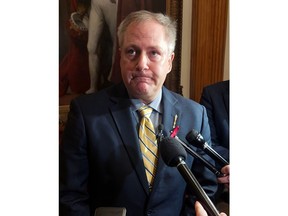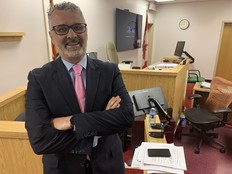Province needs to share 'money in its pocket': mayor
Northern politician says struggling municipalities need serious financial help

Article content
The mayor of a struggling northern New Brunswick community wants the local government minister to release a report he’s had in his hands for weeks.
Jean-Guy Levesque, the mayor of the Campbellton Regional Community, is questioning why Glen Savoie won’t divulge the report’s contents, given that it probably has solutions for a municipality like his.
Savoie has repeatedly refused to tell reporters what’s in the document, saying last week he hadn’t had time to read it.
The topic of the report is municipal financing, which is of great concern to communities struggling to make ends meet in the wake of the Progressive Conservative government’s local government reforms, the biggest in more than 60 years.
“I find it pretty sad that we don’t know what was said to the province,” the mayor told Brunswick News on Thursday. “We believe those economists have put forward some possibilities and we want to know if the province will take action or not.”
Big problems, heavy taxes
Campbellton Regional Community is one of many new local governments created in the wake of reforms on Jan. 1 that saw 340 local entities folded into 89 municipalities and rural districts.
The sprawling, picturesque municipality on the northernly middle tip of the province includes the former City of Campbellton and several other communities, including Atholville and Tidehead. It now has seven distinct tax rates. But it has also inherited a persistent problem: not enough tax revenues to pay for all the services provided to its population of 12,000.
Many of the problems, the mayor said, stem from the former City of Campbellton, which three decades ago built the Memorial Civic Center, a hockey rink, recreational facility and convention centre. It costs $2.6 million a year to run and carries an annual shortfall of about $2 million, a hefty burden for so few people.
We hate to raise taxes on anyone, but for some areas, we have no choice.
Jean-Guy Levesque
Last year, the municipal council raised the Campbellton portion of the tax rate by six and a half cents to $1.84 per $100 of assessed property, the highest rate in the province, at a time when other southern cities such as Saint John, Fredericton and Moncton were slashing their rates. That represents a four per cent increase. Combining the rate with rising property values, many homeowners and businesses are faced with significant tax hikes.
And while the population is growing again, Campbellton’s still recovering from a 40-year exodus that saw the city shrink from more than 10,000 people in 1971 to closer to 7,000 in 2011.
“I hate to say it, but this city is where there are more challenges than anywhere else,” Levesque said, adding his council is struggling to come up with an annual budget by a deadline of Dec. 18. “It’s so hard to take decisions on some of these items, and the cost of living is going up. We hate to raise taxes on anyone, but for some areas, we have no choice. The taxes are going to go up.”
On the brink of failure?
The authors of the report, Université de Moncton economists Pierre-Marcel Desjardins and André Leclerc, have recently been silent about its contents. However, the Liberal and Green opposition said in October they’d heard that the first version of the report had warned that 20 municipalities and eight other local government entities were on the brink of insolvency.
Leclerc, a professor emeritus who used to teach in Edmundston, had delivered a detailed presentation of the early findings to a conference of the francophone municipal association.
It was an astonishing number, almost one-third of the local governments in the province.
But questions remain. For instance, New Brunswick doesn’t allow municipalities to carry deficits, forcing them to chop public services before refusing to pay their bills.
And some newly created communities didn’t have a big enough tax base to be considered financially strong.
I have not read it yet.
Glen Savoie
Savoie flat-out denied there was any kind of insolvency problem, saying the authors had used outdated data in an early version of their report delivered at the end of summer.
The province had a record $8-billion increase in property values this year, translating into an extra $100 million available to local governments if they leave their tax rates the same. Even more money is available if they raise their tax rates, Savoie said.
The economists re-wrote their report with those updated figures, and submitted it in late November, but it remains secret.
“I have not read it yet,” the local government minister said last week. “There are a whole lot of things I have to do, such as deal with everything else that’s going on in the department. I also have to deal with files as government house leader, files as related to la francophonie, so when I have an opportunity, when I have time to set aside to really be able to dig into this, to make sure I have officials with me, to make sure we can give a really good going over of the report and what it means, I’ll do that.
“After that, there will be a process to follow to ensure the other departments that are affected or impacted by this will have an opportunity to see it as well.”
A pitch for tax sharing
The Campbellton mayor has a meeting scheduled with the minister this week. He said he didn’t want to be overly critical of Savoie or provincial government officials, as they have been willing to listen to Campbellton’s problems.
But he said it was obvious municipalities needed more ways to raise money if they want to maintain decent public services. With provincial backing, Levesque added, Campbellton could clean up its financial mess within three years.
“As it stands, the only way we can raise money is through people’s property taxes. But in places like Alberta and Quebec, they’re sharing cannabis tax revenues with municipalities. Fifty years ago, when the police stopped someone for speeding, the money from the ticket was staying in the municipality, now it’s going to the province. Why does New Brunswick need to keep all the money in its pocket and not give us some of that?”












Postmedia is committed to maintaining a lively but civil forum for discussion. Please keep comments relevant and respectful. Comments may take up to an hour to appear on the site. You will receive an email if there is a reply to your comment, an update to a thread you follow or if a user you follow comments. Visit our Community Guidelines for more information.